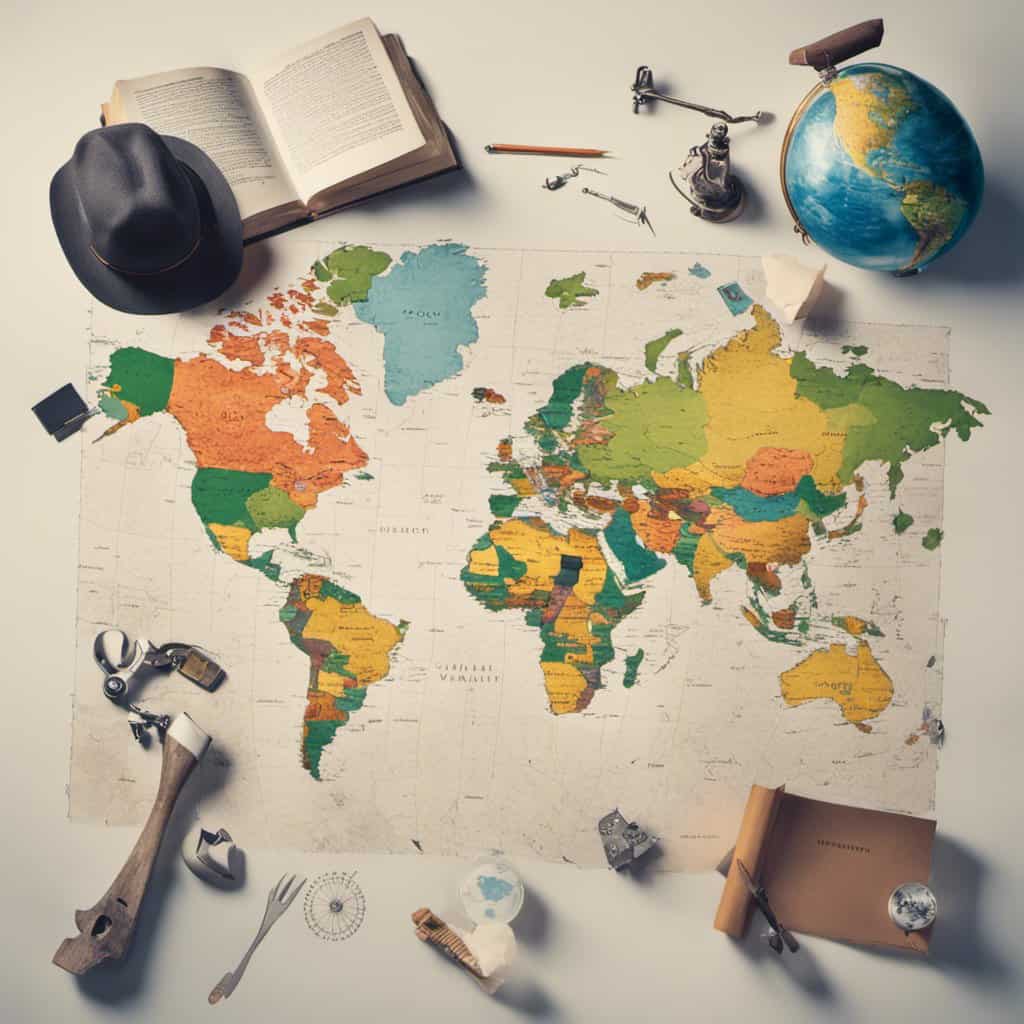Many often wonder how rich they are compared to the rest of the world. The answer to this question can be found through various income percentile calculators and global income distribution studies.
For example, the World Income Percentile Calculator by Giving What We Can allows individuals to input their income and household information to see where they rank in terms of global wealth.
The calculator takes into account factors such as the number of children in the household and the country of residence. Similarly, the OECD’s income comparison tool allows individuals to compare their income to others in their country and around the world.
By using income percentile calculators and global income distribution studies, individuals can gain a better sense of their position in the world and use that knowledge to make informed decisions about their finances.
Understanding Wealth

When it comes to understanding wealth, it’s important to remember that it’s a relative concept. What might be considered wealthy in one part of the world may not be the same in another.
To put things into perspective, let’s take a look at some global income statistics. According to Giving What We Can, a person earning $32,400 per year is in the top 1% of the world’s income earners. Meanwhile, someone earning $1,225 per year is in the top 10% of the world’s income earners.
It’s clear that what might be considered a modest income in a developed country could be considered quite wealthy in a developing country. This is why it’s important to consider income and wealth in a global context.
Another important factor to consider when it comes to wealth is net worth. Net worth is the value of a person’s assets minus their liabilities. This includes things like property, investments, and savings.
According to Kiplinger, in 2022, the top 1% of net worth in the United States had $10,815,000 in net worth, while the top 10% had $854,900. It’s important to note that these figures only apply to the United States and may not be representative of other countries.
Global Wealth Distribution
When it comes to global wealth distribution, the numbers can be staggering. According to a report by the World Economic Forum, the richest 10% of the global population currently take home 52% of the income, while the poorest half of the global population earns just 8%.
The following sub-sections will provide more detailed information on the distribution of wealth across the world.
Top 1% Wealth Holders
The top 1% of wealth holders in the world have an average net worth of $4.5 million, according to a report by Credit Suisse. This group holds 43% of the world’s wealth. In contrast, the bottom 50% of the world’s population holds just 1% of the world’s wealth.
Middle-Class Wealth
The middle class, defined by Pew Research as those who live on $10.01-$20 a day, which translates to an annual income of about $14,600 to $29,200 for a family of four, makes up about 25% of the world’s population. This group holds 32% of the world’s wealth.
Poverty Line Wealth
Those living below the poverty line, defined by the World Bank as living on less than $1.90 a day, make up about 9% of the world’s population. This group holds less than 1% of the world’s wealth.
It’s important to note that these numbers can vary depending on the source and the methodology used to calculate them. However, they do provide a general idea of the distribution of wealth across the world.
Factors Influencing Wealth

There are several factors that can influence an individual’s wealth. Some of the most significant ones include geographical location, education, and occupation.
Geographical Location
Geographical location plays a significant role in determining an individual’s wealth. The cost of living varies greatly from one place to another, and this can have a significant impact on an individual’s financial situation.
For example, someone living in a major city with a high cost of living may need to earn significantly more than someone living in a rural area with a lower cost of living just to maintain the same standard of living.
In addition to the cost of living, the availability of job opportunities can also vary greatly from one location to another.
Some areas may have a thriving job market with numerous opportunities for high-paying jobs, while others may have a more limited job market with fewer opportunities for high-paying positions.
Education
Education is another essential factor that can influence an individual’s wealth. In general, individuals with higher levels of education tend to earn more than those with lower levels of education. This is because higher education can lead to more job opportunities and higher-paying positions.
Additionally, education can also provide individuals with the skills and knowledge they need to manage their finances effectively. This can include understanding how to invest, manage debt, and create a budget.
Occupation
The occupation an individual chooses can also have a significant impact on their wealth. Some occupations, such as those in the medical or legal fields, tend to pay higher salaries than others.
In addition to salary, some occupations may also offer other benefits, such as retirement plans or stock options, that can help individuals accumulate wealth over time.
Measuring Your Wealth

To determine whether you are rich compared to the rest of the world, you need to measure your wealth accurately. There are three main factors to consider: income, assets, and liabilities.
Income
Income is the money you earn from work, investments, or any other sources. To measure your income, you need to calculate your annual gross income. Gross income includes all the money you earn before taxes and deductions.
To calculate your annual gross income, add up all your income sources, including wages, salaries, bonuses, tips, commissions, rental income, and investment income. Once you have your total gross income, compare it to the global average income to see where you stand.
According to the World Bank, the global average income is around $10,000 per year.
Assets
Assets are anything of value that you own, such as property, investments, and savings. To measure your assets, you need to calculate your net worth. Net worth is the difference between the total value of your assets and the total amount of your liabilities.
To calculate your net worth, add up the value of all your assets, including your home, car, investments, savings, and any other valuable possessions. Then subtract all your liabilities, such as mortgages, loans, and credit card debts. The resulting number is your net worth.
Liabilities
Liabilities are any debts or financial obligations you owe, such as mortgages, loans, and credit card debts. To measure your liabilities, you need to calculate your debt-to-income ratio.
To calculate your debt-to-income ratio, divide your total monthly debt payments by your gross monthly income. The resulting number is your debt-to-income ratio. A debt-to-income ratio of 36% or lower is considered healthy, while a ratio above 43% is considered risky.
By measuring your income, assets, and liabilities accurately, you can determine your overall wealth and compare it to the rest of the world. Remember that wealth is relative, and what may be considered rich in one country may not be the same in another.
Conclusion
It is important to recognize that wealth is relative and subjective. While some may feel wealthy and comfortable with their income, others may feel like they are struggling to make ends meet.
The search results show that many people around the world vastly underestimate how rich they are compared to the rest of the world. But keep in mind that even those who may feel like they are not wealthy by their own standards may still be considered wealthy in comparison to others.
The search results also provide tools and resources to help individuals compare their income to others around the world. It is important to use these tools with an open mind and recognize that income is not the only factor that determines wealth and happiness.
By all means, strive for financial stability and security, but it is also important to recognize that money is not the only thing that brings happiness and fulfillment in life.
Frequently Asked Questions
What percentage of the world’s population is considered wealthy?
According to Kiplinger, the top 1% of people in the world are considered wealthy. This group controls over 44% of the world’s wealth. In contrast, the bottom 50% of the world’s population controls only about 1% of the world’s wealth.
How does my income compare to the average income worldwide?
To find out how your income compares to the rest of the world, you can use the World Income Percentile Calculator. This tool allows you to enter your income and household size to determine your percentile ranking.
What is the income threshold for being considered wealthy globally?
According to I Remember the Poor, having assets (not cash) of $2,200 per adult places a person in the top 50% of the world’s wealthiest. To be in the top 10% of the world’s wealthiest, a person would need to have assets of around $77,000.
How much money do I need to be in the top 10% of earners worldwide?
To be in the top 10% of earners worldwide, you would need to have an income of around $32,400 per year. This information is according to a New York Times article.
What are the income disparities between countries in the world?
Income disparities between countries in the world can vary greatly. For example, the average income in the United States is around $63,000 per year, while the average income in India is around $2,000 per year. The World Income Inequality Database provides more information on income disparities between countries.
How do I calculate my wealth compared to the rest of the world?
To calculate your wealth compared to the rest of the world, you can use the Global Rich List tool. This tool allows you to enter your income and household size to determine your percentile ranking and compare your wealth to the rest of the world.
